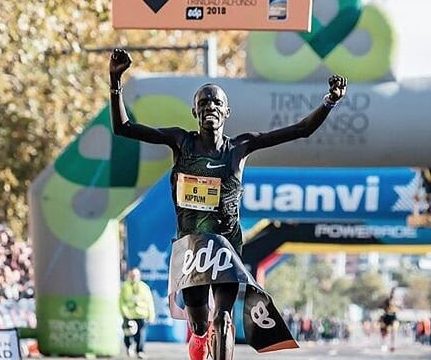Half-marathon world record-holder rejected by Chicago
Abraham Kiptum ran 58:18 breaking an eight-year-old record that was held by Zersenay Tadese, but wasn't admitted to Chicago a few months earlier

?World Record? Abraham Kiptum runs 58:18 half marathon in Valencia pic.twitter.com/7LWqLQWjvX
— FloTrack (@FloTrack) October 28, 2018
On Sunday morning, a previously unknown Kenyan man became the half-marathon world record-holder. Abraham Kiptum ran 58:18, breaking an eight-year-old record that was held by Zersenay Tadese.
But after this record, it surfaced that almost no one knew who he was. How does someone nearly entirely unknown break a world record? Let’s Run explained this in an article yesterday, discussing the differences of the East African and American recruitment and development systems for runners. “…Dennis Kimetto… was discovered by Geoffrey Mutai while he was running on the side of the road in Kenya. Could you imagine Alberto Salazar discovering Galen Rupp just because he happened to see him running around the streets of Portland?”
RELATED: Abraham Kiptum breaks half-marathon world record at Valencia
Jonathan Gault of Let’s Run further reveals that Kiptum was rejected from the Bank of America Chicago Marathon this fall as his credentials, which included a 2:06:29 win in Daegu in April and a 2:05:26 personal best, were not good enough. Instead Kiptum is targeting the Abu Dhabi marathon on December 7.
https://www.instagram.com/p/BpjsMPEnG7N/?hl=en&taken-by=kiptum21k
Kiptum’s story raises a common predicament for elite runners: they’re ready for a breakthrough, but are not being given a spot in big races. Running in good races helps results. It’s a combination of the energy, the depth of the field, and the anticipation of being in a “big” race.
Kate Van Buskirk is the 2014 Commonwealth Games 1,500m bronze medallist and Canadian indoor mile record-holder, but she can recall many instances where she wasn’t given a spot on a start line despite being truly ready to go. “I remember trying to plan my first European racing circuit in 2013, and hearing cautionary stories from veteran Canadian track athletes who had navigated that system for years. They told me about being overseas for weeks at a time, without being confirmed in a single meet, frantically trying to connect with meet directors and solidify a coveted spot on a start line, often unsuccessfully.”
https://www.instagram.com/p/BneG_gugzd8/?hl=en&taken-by=k8vbeast
She continued, “I learned quickly that being “good” wasn’t enough; that you had to be not only Olympic finalist caliber, but also relevant at the time to get into the top races. There have been many times when I’ve known that I’m fit and ready for a fast performance, but there are always dozens of other runners who are telling their agents and meet directors the same story… and there are only so many spots on those start lines.”
Van Buskirk learned that until you run stellar times, it’s a crap shoot as to whether you get into big meets. “But the big meets are where the fast times are run. Its like applying for a job, and the boss wants you to have work experience, but you can’t gain the experience unless someone hires you.”

